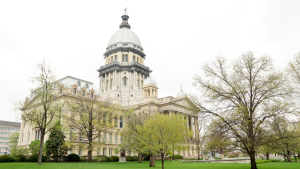Waste Reduction
Zero waste is an achievable and necessary goal
Additionally, even though estimates of Illinois’ waste stream indicate that nearly 20% is organic and 23% is food scrap, only 13% and 1% of these materials, respectively, is diverted from landfills (composted)–this places Illinois behind other states in removing food scrap from our waste stream. There are 42 landfills in Illinois, with a statewide landfill life expectancy of 21 years—that means landfill space in Illinois won’t last forever and we must stop sending valuable materials to be landfilled that will be difficult to recover.
The State of Recycling in Illinois
Our current recycling programs divert over 7 million tons of useful materials from landfills and save enough energy to heat and light 578,000 homes.
Each year, recycling in Illinois reduces water pollution by 21,500 tons of various contaminants and reduces air pollution by 131,000 tons of various contaminants each. What’s more, recycling can create up to 10 times as many jobs as landfilling, while composting can create up to 4 times as many jobs.
In fact, Illinois already has over 110,000 recycling jobs with a payroll of $3.6 billion and $30.3 billion in gross receipts. Furthermore, manufacturing with recycled commodities in Illinois reduces greenhouse gas emissions by 4 million tons (carbon equivalent) a year.
Learn more about what can be recycled in the city of Chicago here.
Current Waste Reduction Laws
- In 2008, Electronic Waste Products Recycling Act was signed into law, requiring electronics manufacturers to collect and recycle or reuse electronic waste. Since 2013, each manufacturer of electronic products in Illinois must recycle or reuse an amount equal to 50% of the weight of what they sell each year. This law bans electronic waste from landfills.
- An amendment to this Act in 2015 amends the Act to raise the 2015 goal from approximately 36.7 million pounds to 46.6 million pounds. The goal increases to 49.6 million pounds in 2016 and 2017 with an understanding that it may still be too low but that it does represent an increase over what would have been expected under the prior statutory formula. This change also addresses the high cost of partially recycling CRT glass by authorizing treated CRT glass to be placed in a retrievable storage cell at a permitted landfill with the weight still counted toward overall electronic recycling goals. Additional recycling methods for CRT, should they become available, will be allowed through the IEPA’s BUD system. Moreover, this bill prohibits charging units of local government for recycling electronics and requires all electronic recycling vendors receiving manufacturer contracts to be R2 or E-Steward certified.
- In 2010, Mercury Thermostat Collection legislation required manufacturers to collect and properly dispose of thermostats containing mercury. An amendment to this Act in 2015, allowed the collection of loose thermostats to count towards these goals.
Amends the Illinois Environmental Protection Act to prohibit the disposal of sharps in recycling containers to protect and keep recycling clean.
A federal law that authorizes the Attorney General to promulgate new regulations for the delivery of unused pharmaceuticals to appropriate entities for disposal in a safe and effective manner. The Act also allows public and private entities to develop a variety of methods of collection and disposal of controlled substances, including pharmaceuticals, in a secure, convenient, and responsible manner in order to reduce the introduction of potentially harmful substances into the environment.
When medication is flushed down the toilet or thrown down the drain, it can end up in our water sources. The long term effects are currently not fully understood, but we do know that pharmaceuticals in the water supply affect the local environment, including aquatic life. This Illinois act, effective since 2010, prohibits the discharge or disposal of any unused medication or prescription drugs into a public wastewater collection system or septic system. The Act also provides for the collection and environmentally safe disposal of these substances. A portion of Heroin Task Force legislation passed in 2015 also provides for the collection and safe disposal of unused controlled substances (e.g., opiates, narcotics, hallucinogens) through a state run program.
Waste Reduction Updates
2025 Chicago City Council Scorecard
IEC's city programs team has published our 2025 Chicago City Council Environmental Scorecard evaluating the performance of alderpersons based on their environmental voting record.
Read More >>2025 Environmental Scorecard
IEC's state legislative team has published our 2025 Environmental Scorecard evaluating the performance of every Illinois state legislator based on their environmental voting record.
Read More >>2025 Legislative Report
IEC's state legislative team has published our 2025 Legislative Report detailing environmental wins and setbacks during this year's legislative session.
Read More >>How can Chicago help curb Lake Michigan microplastic pollution?
Every year, 11.6 million pounds of plastic trash makes its way into Lake Michigan, Chicago’s largest source of drinking water. Even as the city tries...
Read More >>The plastic we drink: How can Chicago help curb Lake Michigan microplastic pollution?
“This is a huge problem that we need to address at a systemic level,” said Gabby Plotkin, senior policy manager at Illinois Environmental Council. Right...
Read More >>Illinois lawmakers consider banning plastic bags for large retailers
Jennifer Walling, executive director of the Illinois Environmental Council, has been working for more than 12 years on the bill to reduce the use of...
Read More >>




